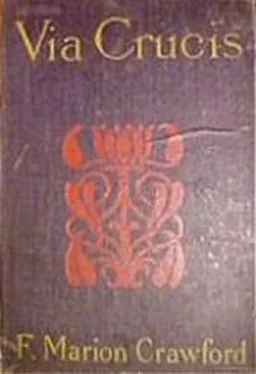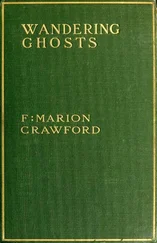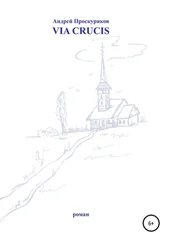F. Crawford - Via Crucis
Здесь есть возможность читать онлайн «F. Crawford - Via Crucis» весь текст электронной книги совершенно бесплатно (целиком полную версию без сокращений). В некоторых случаях можно слушать аудио, скачать через торрент в формате fb2 и присутствует краткое содержание. Жанр: Исторические приключения, на английском языке. Описание произведения, (предисловие) а так же отзывы посетителей доступны на портале библиотеки ЛибКат.
- Название:Via Crucis
- Автор:
- Жанр:
- Год:неизвестен
- ISBN:нет данных
- Рейтинг книги:3 / 5. Голосов: 1
-
Избранное:Добавить в избранное
- Отзывы:
-
Ваша оценка:
- 60
- 1
- 2
- 3
- 4
- 5
Via Crucis: краткое содержание, описание и аннотация
Предлагаем к чтению аннотацию, описание, краткое содержание или предисловие (зависит от того, что написал сам автор книги «Via Crucis»). Если вы не нашли необходимую информацию о книге — напишите в комментариях, мы постараемся отыскать её.
Via Crucis — читать онлайн бесплатно полную книгу (весь текст) целиком
Ниже представлен текст книги, разбитый по страницам. Система сохранения места последней прочитанной страницы, позволяет с удобством читать онлайн бесплатно книгу «Via Crucis», без необходимости каждый раз заново искать на чём Вы остановились. Поставьте закладку, и сможете в любой момент перейти на страницу, на которой закончили чтение.
Интервал:
Закладка:
"I had forgotten what brought me here," said the friar, producing a small roll of parchment tied and bound together with thin leathern laces, and tied again with a string of scarlet silk to which was fastened a heavy leaden seal. "I have here a letter for you."
"A letter!" Gilbert showed a not unnatural surprise. He had never received a letter in his life, and in those days persons of ordinary importance rarely sent or received messages except by word of mouth.
"I went to your lodging," replied the monk, handing Gilbert the parchment. "I guessed that I might find you here, where we have met before."
"I thank you," said Gilbert, turning the roll over in his hands as if hardly knowing what to do. "How came you by this?"
"Last night there arrived messengers from France," answered Arnold, "bringing letters for the Senate and for me, and with them was this, which the messenger said had been delivered into his hand by the Queen of France, who had commanded him to find out the person to whom it was addressed, and had promised him a reward if he should succeed. I therefore told him that I would give it to you."
Gilbert was looking at the seal. The heavy disk of lead through which the silken strings had been drawn was as large as the bottom of a drinking-cup and was stamped with the device of Aquitaine; doubtless the very one used by Duke William, for it bore the figures of Saint George and the Dragon, which Eleanor was afterwards to hand down to English kings to this day. Gilbert tried to pull the silk cord through the lead, but the blow that had struck the die had crushed and jammed them firmly.
"Cut it," suggested the friar, and his ascetic face relaxed in a smile.
Gilbert drew his dagger, which was a serviceable blade, half an ell long, and as broad as a man's three fingers under the straight cross— hilt, and as sharp as a razor on both edges, for Dunstan was a master at whetting. Gilbert cut the string and then the laces, and slipped the seal into his wallet, unrolling the stiff sheet till he found a short writing, some six or eight lines, not covering half the page, and signed, 'Eleanora R.'
But when he had opened the letter he saw that it was not to be read easily. Nevertheless, his eye lighted almost at once upon the name which of all others he should not hare expected to find there, 'Beatrix.' There was no mistaking the letters, and presently he found them once again, and soon after that the sense was clear to him.
'If this reach you,' it said, in moderately fair Latin, 'greeting. I will that you make haste and come again to our castle in Paris, both because you shall at all times be welcome, and more especially now, and quickly, because the noble maiden Beatrix de Curboil is now at this court among my ladies, and is in great hope of seeing you, since she has left her father to be under my protection. Moreover, Bernard, the abbot, is preaching the Cross in Chartres and other places, and is coming here before long, and to Vezelay. Beatrix greets you.'
"Can you tell me where I can find the messenger who brought you this?" asked Gilbert, looking up when he had at last deciphered every word.
But Arnold was gone. The idea that an acquaintance whom he had been endeavouring to convert to republican doctrines should be in correspondence with one of those sovereigns against whom he so bitterly inveighed had finally disgusted him, and he had gone his way, if not in wrath, at least in displeasure. Seeing himself alone, Gilbert shrugged his shoulders indifferently, and began to walk up and down, reading the letter over and over. It was very short, but yet it contained so much information that he found some difficulty in adjusting his thoughts to what was an entirely new situation, and one which no amount of thinking could fully explain. He was far too simple to suppose that Eleanor had called Beatrix to her court solely for the sake of bringing him back to Paris. He therefore imagined the most complicated and absurd reasons for Queen Eleanor's letter.
He told himself that he must have been mistaken from beginning to end; that the Queen had never felt anything except friendship for him, but a friendship far deeper and more sincere than he had realized; and he was suddenly immensely grateful to her for her wish to build up happiness in his life. But then, again, she knew as well as he-or as well as he thought he knew-that the Church would not easily consent to his union with Beatrix, and as he closed his eyes and recalled scenes of which the memories were still vivid and clear, the shadow that had chilled his heart in Paris rose again between him and Eleanor's face, and he distrusted her, and her kiss and her letter, and her motives. Then, too, it seemed very strange to him that Beatrix should have left her father's house; for Arnold de Curboil had always loved her, and it did not occur to Gilbert that his own mother had made the girl's life intolerable. He was to learn that later, and when he knew it, he tasted the last and bitterest dregs of all. Nevertheless, he could not reasonably doubt the Queen's word; he was positively certain that he should find Beatrix at the French court, and from the first he had not really hesitated about leaving at once. It seemed to be the only possible course, though it was diametrically opposed to all the good resolutions which had of late flitted through his dreams like summer moths.
On the next day but one, early in the spring morning, Gilbert and his men rode slowly down the desolate Via Lata, and under Aurelian's arch, past the gloomy tomb of Augustus on the left, held by the Count of Tusculum, and out at last upon the rolling Campagna, northward, by the old Flaminian Way.
Chapter X
June was upon Italy, as a gossamer veil and a garland on the brow of a girl bride. The first sweet hay was drying in Tuscan valleys; the fig leaves were spreading, and shadowing the watery fruit that begins to grow upon the crooked twigs before the leaves themselves, and which the people call "fig-blossoms," because the real figs come later; the fresh and silvery olive shoots had shed a snow-flurry of small white stars; the yellow holy thorn still blossomed in the rough places of the hills, and the blending of many wild flowers was like a maiden blush on the earth's soft bosom.
At early morning Gilbert rode along the crest of a low and grassy hill that was still sheltered from the sun by the high mountains to eastward, and he drank in the cool and scented air as if it had been water of paradise, and he a man saved out of death to life by the draught. There was much peace in his heart, and a still security that he had not felt yet since he had seen his father lying dead before him. He knew not how it was, but he was suddenly sure that Beatrix loved him and had escaped to the court of France in the hope of finding him, and was waiting for him day by day. And he was also sure that the Church would not cut him off from her in the end, let the churchmen say what they would. Was not the Queen of France his friend? She would plead his case, and the Pope would understand and take away the bar. He thought of these things, and he felt his hopes rising bright, like the steady sun.
He reached the end of the crest and drew rein before descending, and he looked down into the broad valley and the river winding in and out among trees, gleaming like silver out there in the sun beyond the narrowing shadow, then dark blue, and then, in places, as black as ink. The white road, broad and dusty, winding on to Florence, followed the changing river. Gilbert took his cap from his head and felt the coolness of the morning on his forehead and the gentle breath of the early summer in his fair hair; and then, sitting there in the deep silence, bareheaded, it seemed to him that he was in the very holy place of God's cathedral.
"The peace of God, which passeth all understanding," he repeated softly and almost involuntarily.
Читать дальшеИнтервал:
Закладка:
Похожие книги на «Via Crucis»
Представляем Вашему вниманию похожие книги на «Via Crucis» списком для выбора. Мы отобрали схожую по названию и смыслу литературу в надежде предоставить читателям больше вариантов отыскать новые, интересные, ещё непрочитанные произведения.
Обсуждение, отзывы о книге «Via Crucis» и просто собственные мнения читателей. Оставьте ваши комментарии, напишите, что Вы думаете о произведении, его смысле или главных героях. Укажите что конкретно понравилось, а что нет, и почему Вы так считаете.










